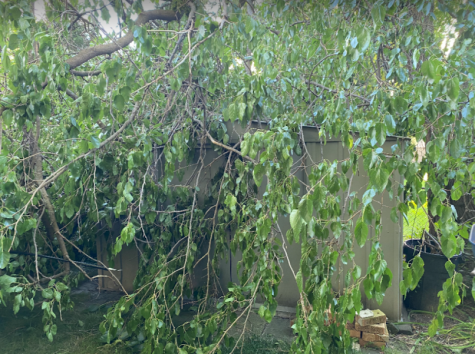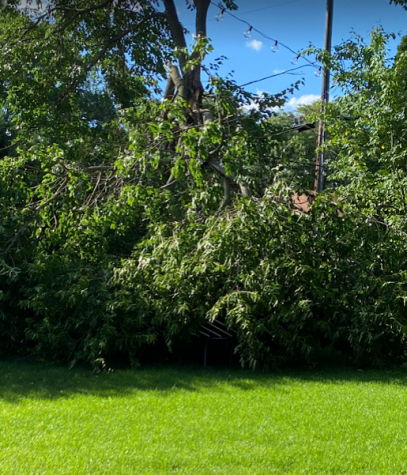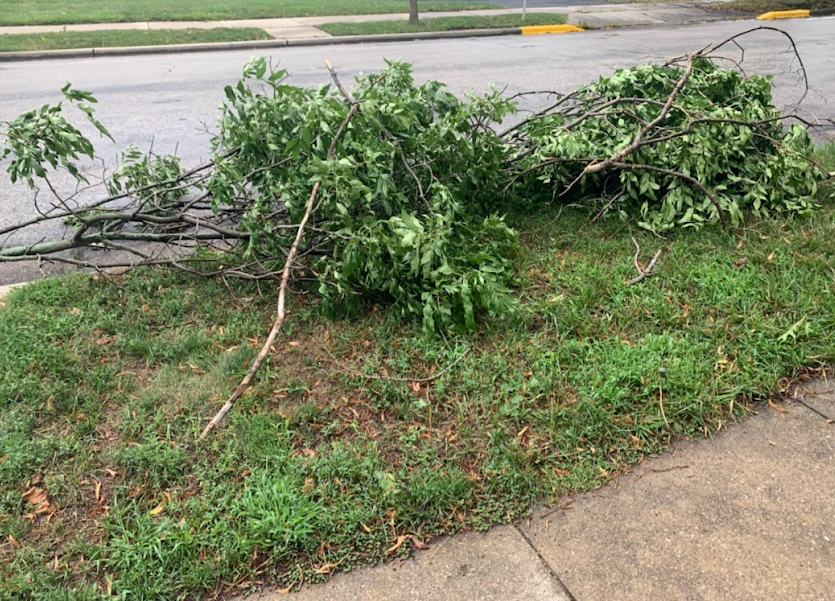Power Outages Burden Students; Cause Climate Concerns
These pictures show fallen branches and debris that caused problems for many residents of Wauwatosa.
August 14, 2021
Tosa East Junior Maddie Brown walked the mile from her house to school 3 times on Wednesday, once to get to swim practice and twice to get to and from registration. The power outage caused by Tuesday night storms meant her electric garage door couldn’t be opened – and that she couldn’t access her bike.
“Normally I bike to the places that I want to go when my parents are using the cars,” she said. “I’ve been walking everywhere”.
Brown’s unusual predicament is just one of many experienced by tens of thousands of people across Southeastern Wisconsin.
A total of around 150,000 people lost power on Tuesday, August 10th, making it one of the biggest outages in decades. Many didn’t have power restored until several days later.
“I’ve never seen anything like it and I’ve lived in Tosa for 14 years,” said Tosa East alumna and college student Genna Andersen. “It was wild for the power to be out for that amount of time.”
Andersen had to deal without electricity to power lights, heat water, run kitchen appliances or power the air conditioning. A specific worry for Brown was an old tree in front of her neighbor’s house that seemed vulnerable in the storm.
“The city has been planning to take it down for a while,” she said. “The storm cracked one of the branches and they’ve been too busy with other tree-related issues to come and deal with it.”
Brown also noted the heat as a particularly challenging obstacle for her. Temperatures crept into the upper 80s with heat indices into the 90s on Wednesday, and without air conditioning, her house became almost unbearably hot.
“I can’t sleep in my own bed,” Brown said of her second floor bedroom.
The heat, humidity and violent storms are a practical and logistical nightmare, but beyond that, they stir up worries about increasingly hostile and unpredictable weather, and can worsen climate anxiety.
“It was definitely worrying,” Andersen said.
At the very least, the storms give us a glimpse into a possible future – frequent outages, heat waves and general chaos in the weather. According to an article published by the Milwaukee Journal Sentinel, severe storms like those experienced on Tuesday may become more frequent because of climate change. These types of storms take a toll not only on infrastructure but on mental health, as the implications of an uncommon storm bring to the front of many minds concerns about the future of the planet.
According to a 2020 study done by the UK Environmental Agency, experiencing a severe storm or flood with significant damage increases the chances of stress and depression by 50%. Though potentially less severe than the storms in the study, Tuesday’s storms can nevertheless impact the mental health of those who were affected.
However, while outages and storms may point out a lack of climate resiliency, Brown is hopeful that they could help the community plan for the future.
“I think that after we recover from this situation there’s a possibility that Wauwatosa will be better prepared for a future event,” Brown said. She looks forward to when the power turns back on, specifically so that the water heater can be running again.
“One thing I will definitely appreciate when the power is back on is a hot shower,” she said.
According to We Energies, the majority of power should be restored and remaining outages should have crews assigned by mid-day Saturday.















